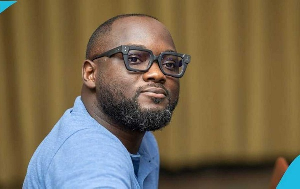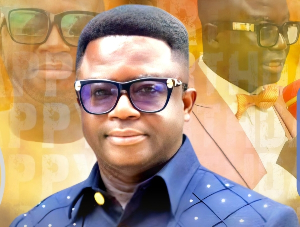I have always resisted the temptation to respond to Kwame Okoampah-Ahoofe’s articles. He has, on several occasions, needlessly reacted to my articles in a confusing and biased way, but I have always maintained that reacting to those poorly written and insult-laden write ups would dignify him.
But for how long should we keep quiet and allow one of our own to subject his countrymen to incessant insults? At least we assume the man is sane, and so do those who come across his writings on the internet. I’m compelled to react to this particular article of his due his unprovoked attack on my mentor, Mr. Kwaku Sakyi-Addo, and his disdainful attitude toward lecturers of the Ghana Institute of Journalism (GIJ) by comparing his works to theirs. This was contained in his recent article titled “Valerie Sackey is a typical lickspittle” published on several websites.
As usual the self-styled PhD holder, who misses no opportunity to flaunt his academic credentials, had nothing to say but vilify others. Mrs. Valerie Sackey, in her review of Nana Ato Dadzie and Kwamena Ahwoi’s book, Justice Francis Daniel Annan: In the Service of Democracy, pointed out some linguistic and factual errors the authors deliberately or mistakenly made. After reading her comprehensive and intellectually stimulating review, any academic worth their credentials would not have reacted the way Okoampah did.
Most accounts of historical events in this country have been written like fiction or opinion columns. This leaves us without an authentic history as a nation. Mrs. Sackey’s bold attempt in putting issues in their right perspective therefore is very commendable though she failed to point out the strengths of the book. For Okoampah to subject Mrs. Sackey’s critique to such childish analyses, is indeed very unfortunate. Before he attacked Mrs. Valerie Sackey, however, Kwame Okoampah-Ahoofe decided to subject one of the hallowed names in journalism (worldwide, and not Ghana alone) to ridicule. He writes:
” Not quite long ago, for instance, Mr. Kwaku Sakyi-Addo, then working for the British Broadcasting Corporation (BBC), did a piece that was supposed to be a review of a collection of editorial writings put together by Ms. Elizabeth Ohene, the former cabinet member of the Kufuor administration and a former editor of Ghana’s Daily Graphic. Needless to say, Mr. Sakyi-Addo’s review, which was absolutely no review at all, was, to say the least, utterly embarrassing.
“….For a journalist in the employ of the BBC, I found such critical travesty to be all the more troubling. I was, thus, not the least bit surprised when several months later I learned about Mr. Sakyi-Addo’s parting of the ways with the world’s number one broadcaster. It made perfect sense to me, because his poor excuse of a book review had more than amply convinced me that Mr. Sakyi-Addo was simply a lazy book critic, which means one who hardly read beyond the blurb or dust-jacket and an introductory page or two.”
Will an intelligent primary school pupil come to this conclusion? Okoampah does not end there.
“It also set me wondering about the sort of curricular fare administered by the Ghana Institute of Journalism (GIJ). I wondered, for instance, whether like me, the instructors of the GIJ’s writing programs assigned book reviews, among other forms of esthetic and critical/literary writing, to their students.”
I was at the launch of Elizabeth Ohene’s books – “Thinking Allowed” and “Stand Up and Be Counted”. And I savoured the spell-binding review by Kwaku Sakyi-Addo. I had just come from Kete-Krachi to start my four-year programme in journalism, and the occasion provided me the opportunity to meet two of the media personalities I had long chosen as my mentors before I dreamt about a career in journalism. I had read Kevin Shillington’s Ghana and the Rawlings Factor in Krachi Senior High School. The author recounted Elizabeth Ohene’s bravery in the heat of 1979 uprisings when she was then at the Daily Graphic hence my admiration of her.
With regards to Kwaku Sakyi-Addo, it was through his programme on GTV that I got to know him. Anytime I returned from farm on Sunday in my JHS days, I sneaked to Akorsu’s house (the only man who owned a TV set in our part of Kete-Krachi Lakeside) to watch Kwaku One-on-One. When I saw the notice about the book launch at the Ghana International Press Centre, I thought a golden opportunity had come for the boy from Hon. Albert Abongo’s Bongo to see his admirers, fiili fiili. And indeed, Kwaku’s creativity, simplicity and peerless command of both content and language made his review different from the usually boring book reviews we know of.
So Okoampah has no point.
It is indeed out of ignorance that the mouse attacked the cat. Kwaku Sakyi-Addo is a personality youngsters who know what they want in journalism are looking up to. He is a jack of all trade and a master of all. Be it television, radio and print, Kwaku is simply matchless. I have read all of Kwaku’s articles on his website and have printed some for reference.
I therefore refer Okoampah to www.sakyi-addo.com. If he has the fear of God in him, he will apologise to Kwaku after reading just one of those articles. Not only will he realise, after reading Kwaku’s writings, that Kwaku is a man of his own class, but he will also find good materials for his so-called Journalism and Creative Writing class.
In his Things Fall Apart, Chinua Achebe teaches us that “he who pays homage to the great paves way for his own greatness.” Instead of constantly vilifying people like Kwaku Sakyi-Addo, who have made being Ghanaian a pride, Kwame Okoampah-Ahoofe and those like him should strive to make a name for themselves. Okoampah has attacked and insulted almost all people and writers of substance, from Dr. Kobina Arthur Kennedy to Vice President John Dramani Mahama. Yet, he is one of the worst writers I have read in all my life.
I have read somewhere that people like Okoampah have a psychological problem. They feel inferior and insufficient and the only way to feel important is to bring others down. In fact, the first time I read Kwame Okoampah-Ahoofe’s article and saw that he was a PhD holder, I didn’t take it serious until he later added “governing board member of the Danquah Institute” to his long CV which appears under every scrap he writes.
Okoampah should also not think the fact that he is teaching in a so-called university in America brings him closer to the learned lecturers of the Ghana Institute of Journalism, my alma mater. I don’t think GIJ will ever accept someone like him to teach. If students and authorities of Okoampah’s “university” have been reading his writings and still keep him there, then it isn’t a serious school. There is nothing journalistic about Okoampah’s writing, and I don’t also think insulting people amounts to creativity.
The use of “big” and fanciful words does not amount to good English. Besides, every first year student of the Ghana Institute of Journalism would be able to say that Okoampah’s sentence constructions are very nauseating, to say the least. In his article titled The Book My Children Will Not Read, Okoampah wrote an average of 67 words per sentence, with no variation in sentence lengths. I think Okoampah’s attitude is an indictment on the image of the Danquah Institute. One may not agree with Gabby Otchere Darko, the Executive Director of the Institute, but his arguments are logical and reasonable. His writings make interesting reading. I therefore see no reason why the Danquah Institute should admit the likes of Okoampah into their fold.
My piece of advice to the so-called associate professor of English, Journalism and Creative Writing is that whatever he does has a toll on the image of Ghana and Africa at large. Someone is likely to look down on Ghanaian or African scholars after reading him. He should also do his level best to stay away from individuals like, Kwaku Sakyi-Addo. Kwaku may not have a PhD, but his works outpace PhD holders. He is a national asset. Kwaku has given and continues to give a lot of hope to aspiring journalists in Ghana, Africa beyond.
Kwame Okoampah-Ahoofe, like the Professors of Parrotology in Ngugi Wa Thiongo’s Matigari, will always flaunt useless academic titles. But the time has come for Africans to celebrate geniuses and rare gems such as Kwaku Sakyi-Addo, instead of vilifying them. Both Kwaku Sakyi-Addo and Valerie Sackey are qualified enough to teach Kwame Okoampah-Ahoofe, PhD (Pull him Down).
If he’s too proud, to contact them for tutorials, he should start reading them. Their writings are the pearls of wisdom he very much needs to grow up!
Credit: Manasseh Azure Awuni. The writer is freelance journalist based in Accra, Ghana. Email:azureachebe2@yahoo.com, website: www.maxighana.com
Opinions of Wednesday, 23 March 2011
Columnist: Awuni, Manasseh Azure














